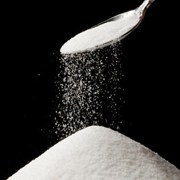 Photo: Getty Images
Photo: Getty Images
A healthy resolution idea would be to cut down on sugar this New Year. Sugar can cause many health problems, particularly when taken in excess. Some of the problems sugar can cause are:
• Tooth decay
Sugar reacts with the bacteria in your mouth. This forms an acid that attacks your teeth and gums and can cause loss of enamel and tooth decay. After only one sugary snack or drink, your teeth can be under attack for up to one hour. (1)
• Immune System Depression
• Insulin Resistance
The body’s ability to respond appropriately to insulin is reduced after consumption of sugary drinks and fruit juices. People who have insulin resistance are more likely to develop type 2 diabetes and heart disease, when compared with healthy people. (3, 4 and 5)
• Too much fructose (fruit sugar)
When combined with not enough magnesium it may cause inflammation. This combination results in increased markers for inflammation and oxidative stress. The researchers also said that fructose and low magnesium can also cause insulin resistance, high blood pressure and high "bad" cholesterol levels.
Too much sugar and deficiencies in other nutrients may be the real reason why first world societies have epidemic levels of diabetes, obesity and high blood pressure. Inflammation can also trigger cancer. Although inflammation is usually a positive response of the immune system, chronic long-term inflammation can be damaging and has been associated with the development of cancer. (6 and 7)
• Obesity
High fat isn’t the problem, it's high sugar. When scientists fed rats high fructose corn syrup it made them all overweight, even at levels much lower than in soda. Rats given a high fat diet without the sugar didn’t gain extra weight.
Professor Bart Hoebel, an expert in weight and sugar addiction said,
“Some people have claimed that high-fructose corn syrup is no different than other sweeteners when it comes to weight gain and obesity, but our results make it clear that this just isn't true, at least under the conditions of our tests.” (8)
• Non-alcoholic fatty liver disease
Consumption of fructose sugar can lead to intestinal bacterial overgrowth and make them more permeable, leading to non-alcholic fatty liver disease. (9)
• Sugar substitutes like aspartame aren’t a healthy alternative, either.
According to an FDA docket of information on aspartame, studies have shown a link between aspartame containing diet drinks and brain tumors, memory loss, and other deleterious effects. When aspartame is consumed, it can convert into formaldehyde, a cancer causing substance, and accumulate within your cells.
Chronic pain conditions can also be caused by aspartame. Some sufferers of fibromyalgia completely recovered after eliminating aspartame and monosodium glutamate (MSG) from their diet. (10)
How Do I Reduce Sugar in My Diet?
Look at the ingredients of the foods you buy carefully. The largest quantity of ingredient is always listed first and the smallest ingredient is listed last so if you have sugar, sucrose, fructose or other sugar additive listed near the top of the list, your product contains a larger percentage of sugar. Cut these kinds of items out of your diet.
Reduce or cut out sodas, even diet sodas.
Getting fruit juice directly from the fruit is healthier than drinking refined fruit juices. Many commercial brands also have sugar or sweeteners added, so eat plenty of juicy fruits and drink water instead.
If you drink tea or coffee, leave out the sugar.
If you are fond of cookies and cakes, bake your own using sugar-free recipes.
When cooking, you can sometimes use honey as a natural sweetener. It is in its raw state so has not been associated with the same ill health conditions that sugar and fructose have.
Only use honey for people over the age of one year, as it may cause botulism infection in babies.
Honey can also be used to sweeten herbal teas.
Sources:
1. British Dental Health Foundation, Diet. Web. 29 December 2011. http://www.dentalhealth.org/tell-me-about/topic/sundry/diet
2. Role of sugars in human neutrophilic phagocytosis, American Journal of Clinical Nutrition, Vol 26, 1180-1184, 1973. Abstract: http://www.ajcn.org/content/26/11/1180.abstract
3. Consuming fructose-sweetened, not glucose-sweetened, beverages increases visceral adiposity and lipids and decreases insulin sensitivity in overweight/obese humans, J Clin Invest. 2009;119(5):1322–1334. Full Text: http://www.jci.org/articles/view/37385
4. Insulin Resistance and Pre-diabetes, National Diabetes Information Clearing House, U.S Department of Health and Human Services. Web. 29 December 2011. http://diabetes.niddk.nih.gov/dm/pubs/insulinresistance
5. Surrogate markers of insulin resistance are associated with consumption of sugar-sweetened drinks and fruit juice in middle and older-aged adults. J Nutr. 2007 Sep;137(9):2121-7. Abstract: http://www.ncbi.nlm.nih.gov/pubmed/17709452?dopt=Abstract
6. High fructose consumption combined with low dietary magnesium intake may increase the incidence of the metabolic syndrome by inducing inflammation, Magnes Res. 2006 Dec;19(4):237-43. Abstract: http://www.ncbi.nlm.nih.gov/pubmed/17402291?dopt=Abstract
7. Why Cancer and Inflammation? Yale J Biol Med. 2006 December; 79(3-4): 123–130. Full Text: http://www.ncbi.nlm.nih.gov/pmc/articles/PMC1994795
8. A sweet problem: Princeton researchers find that high-fructose corn syrup prompts considerably more weight gain. Princeton University. Web. 29 December 2011.
http://www.princeton.edu/main/news/archive/S26/91/22K07
9. Nonalcoholic Fatty Liver Disease in Humans Is Associated with Increased Plasma Endotoxin and Plasminogen Activator Inhibitor 1 Concentrations and with Fructose Intake, J. Nutr. 138:1452-1455, August 2008. Abstract: http://jn.nutrition.org/content/138/8/1452.abstract
10. FDA Aspartame Docket. Web. 29 December 2011. http://www.fda.gov/ohrms/dockets/dailys/03/Jan03/012203/02P-0317_emc-000205.txt
Reviewed December 29, 2011
by Michele Blacksberg RN
Edited by Jody Smith






Add a CommentComments
There are no comments yet. Be the first one and get the conversation started!